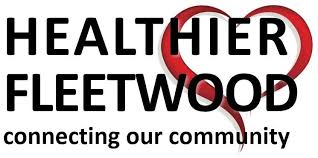Healthier Fleetwood: capturing insights, sharing impact (Professor Emmanuel Tsekleves)

What lessons can the rest of the UK learn from a community health initiative in the Lancashire coastal town of Fleetwood?
This question underpinned a collaborative project, funded by an Impact Acceleration Account (IAA) and conducted by ImaginationLancaster at Lancaster University, which uses design-led research to make a difference in the real world.
Healthier Fleetwood began life in 2016 as an innovative point of contact for the community, supporting them to improve their own health and wellbeing. “It’s run by the residents for the benefit of the residents,” says local GP Dr Mark Spencer, who helped set up the volunteer network. “It’s about connecting residents to services and to each other, overcoming social isolation, motivating and encouraging people to become more active, to engage in community-type activities, whether those activities are singing, or art, or walking football.”
Over the following years, Lancaster University had built up a strategic partnership with Healthier Fleetwood, with research focused on health outcomes in the town including an EPSRC IAA-funded project to explore the impact of COVID-19 on the community. With the benefit of ESRC IAA growth funding, a project was developed to capture the lessons learned.
“What has worked, why has it worked and how we can share it?” summarises Dr Emmanuel Tsekleves, Professor in Global Health Design Innovation at ImaginationLancaster. “To understand the different perspectives, we engaged in a kind of formal evaluation – with the professional stakeholders on one side of the coin, and with the residents on the other.”
“With the professional stakeholders it was mainly structured interviews, mainly online,” he says. “But with the residents the format was more conversational and open-ended, because we wanted to hear their stories. The IAA enabled us to send a researcher to engage with the residents and run workshops.”
“There were lots and lots of examples of people improving their lifestyles, not because any healthcare professional had told them to do it but because they were getting emotional stimulus and becoming a little bit more active,” says Dr Spencer. “And the University was collecting these stories about the impact on individual lives – over and above the positive impact it was having on NHS hospital attendance.”
Dr Tsekleves highlights the highly personal but transformational nature of the stories. “There was a lady whose partner had died and who didn’t have any other friends or connections or family – in essence what she was telling us was that Healthier Fleetwood saved her life. And there were so many stories like that. I hadn’t realised that a non-medical intervention would have such a deep, positive impact on people’s mental health and wellbeing.”
The next question was how best to share this evidence. Working closely with Dr Spencer, the University team took the decision to produce two complementary versions of a publication, presented in layman’s language and available both in print and online, that became ‘The Little Book of Healthier Fleetwood’ part of the 'Little Books' series.
The first ‘Little Book’, co-designed with the residents themselves, pulled together their inspiring stories of life and health empowerment, told from their perspective. The second was aimed at connecting professional stakeholders and included key insights to aid in replicating the programme in other UK towns.
In each case, as Dr Tsekleves explains, the books draw both on Healthier Fleetwood’s role in giving residents a ‘voice’ and on the matching need for local authorities, health organisations and policymakers to pay heed to what they are saying. “It’s about listening and enabling communities to develop themselves. And we hope that having gathered that evidence, we can convert others to that way of thinking.”
As an indication of how the books are being used, he points to a series of online webinars, organised by the NHS, at which he and Dr Spencer present this project to a substantial audience of healthcare professionals, who are given access to the PDF copies. There is, he says, an appetite within the NHS to find out more.
It was the IAA that funded the production of the ‘Little Books’, in addition to a range of other outputs, both academic and non-academic. In turn, Dr Tsekleves envisages that it will have an impact on future funding applications, including long-term funding for Healthier Fleetwood, now that they have had a formal evaluation performed in collaboration with a university.
He is quick to praise the straightforward, internally administered nature of the IAA application process and the provision of support during the crucial early stages of the bid’s development. “Also, what was great was them connecting us to these other projects, so once we got the funding – because we were all working with Healthier Fleetwood – it enabled us to maximise its value.”

